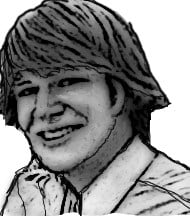
Justice Is Served
[email protected]
As a cognitive science major, I never thought that my classwork would inform my alter ego as a columnist on social justice, but it turns out that education can inform your life in ways you don’t expect. One of the things I’ve learned from my classes is that analogy and metaphor are powerful cognitive tools — they help us with diverse tasks such as understanding mathematics, communicating our experiences and tackling social problems like poverty, crime and disease. After hearing about the recent program launched by Hillary Clinton and the U.S. Agency for International Development to eradicate extreme poverty by 2030, I started thinking that Americans could benefit from changing the way they conceptualize poverty.
Conceptual systems and the way we frame ideas using analogy and metaphor can have a serious impact on the way we approach social problems like poverty. A 2011 study at Stanford University found that exposure to even a single metaphor can induce substantial differences in opinions about how to solve social problems. Participants were asked to read a report describing a crime problem in a fictional city. In some of the reports, crime was described as a beast, and in others, it was described as a virus. Then the participants were asked to propose a solution.
The majority of participants who read that crime was a virus proposed finding the root causes of the issue and implementing social reform, while the majority of participants who read crime as a beast proposed fighting back against crime by hiring police officers and building jails. The study authors added that these metaphor-induced differences in opinion are independent of pre-existing belief systems, like party affiliation. This means that the way we metaphorically frame social problems implicitly influences the decisions we make to solve them.
Traditionally, poverty is described as an entity at war with a country: Public programs “die” after funding is scarce, employment is an anti-poverty “weapon” and, as Ronald Reagan famously stated, “We fought a war against poverty, and poverty won.” In part, the association seems reasonable — poor people have a lower life expectancy, higher prevalence of disease and starvation and people in poorer areas will find any excuse to get out, much like soldiers at war. However, framing poverty as a warring faction inspires problem-solving that mimics the properties of war: The responsibility is out of the American people’s hands; it is the government’s problem — a distant problem in a different world. As university students, it may be easy to conceptualize poverty that way, but it minimizes the active role each of us can take in solving it.
If anything, poverty is a wound for us to heal. There are many ways to get involved on campus, including organizations like Alternative Breaks, EducationCorps at UCSD, UCSD Whole Planet Foundation, the recently launched Policy Design and Evaluation Lab and countless other opportunities. Be active and try to make a difference, and maybe by 2030, we’ll have begun to heal the poverty wound.









Austin Dang • Apr 23, 2014 at 7:13 pm
This is a thoughtless commentary on poverty.
Mark Bergel • Apr 21, 2014 at 3:03 pm
Good to see someone share how significant metaphors are in our society, as well as your conclusion about poverty as something we heal as a people. Whether this is through a “grassroots” effort or whatever way ones wishes to describe all of us making it a priority, the most effective answers will come when we are all focused on helping our neighbors rise out of poverty.